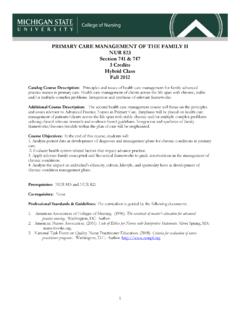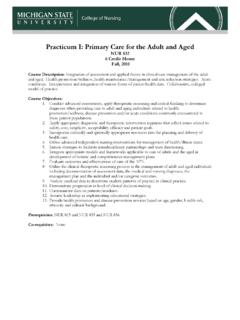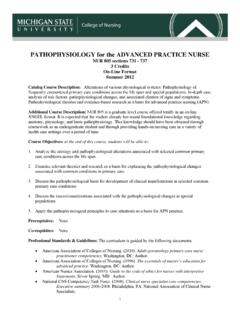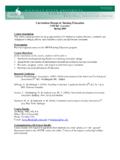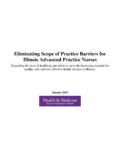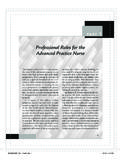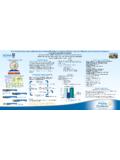Transcription of PRACTICUM II: PRIMARY CARE OF THE ADULT and …
1 PRACTICUM II: PRIMARY care OF THE ADULT and OLDER ADULT NUR 834/854: Hybrid Credits: 7 SPRING 2012 Catalog Course Description: Integration of assessment and applied theory in clinical management. Management of acute and chronic health problems, promotion of rehabilitation and heath maintenance for ADULT and aging individuals across a variety of environments. Provision of specialized, culturally appropriate care to aging individuals, family members, and the community. Collaborative interdisciplinary models of practice. Additional Course Description: This course is designed to help the APN student focus on the integration of assessment, the nursing process, and applied theory in PRIMARY and long-term care management of adults and older individuals. This course will assist the APN student with integration and application of assessment and management skills utilizing a collaborative, interdisciplinary team model of advanced care practice.
2 Relevant conceptual and theoretical frameworks in the PRIMARY care management of adults and older individuals will be utilized in the approach to person-centered care . The individual patient is considered within the context of family and community. Emphasis is on developing and refining clinical skills in the health- care management of individuals with stable chronic or complex health problems and functional losses. The APN student will become increasingly independent in their clinical decision-making skills and the ability to manage ADULT health concerns, including those of the frail elderly, in a practice setting. Course Objectives: At the conclusion of this course, the student will be able to: 1. Develop and implement evidence-based plans addressing PRIMARY care needs of ADULT , aging, and frail elderly patients.
3 2. Assume complex and advancing leadership roles to initiate and guide change in an ever-evolving health care system. 3. Apply ethically sound and culturally competent solutions to complex issues impacting individuals, populations, and systems. 4. Demonstrate leadership to optimize team function including patient/family empowerment and advocate for equity in access to high quality PRIMARY care . 5. Critically analyze evidence and develop a plan for addressing quality and/or safety issues impacting health outcomes. 1 2 Prerequisite(s): NUR 832 or 852 Students are expected to enter NUR 834/54 with adequate physical assessment and documentation skills for the advanced practice level. Additionally, a comprehensive knowledge base in pharmacology and pathophysiology is expected.
4 Remediation at this level will be done independently (with faculty approval and guidance) prior to re-enrollment in the clinical course sequence. Faculty: Linda Keilman, DNP, GNP-BC Assistant Professor (HP) Office: A126 Life Sciences Building Phone: 517-355-3365 or Toll Free #: 1/800/605-6424 Email: or Ann Edwards, MSN, RN, ANP Assistant Professor (HP) Office: A130 Life Sciences Building Phone: 517-353-4748 or Toll Free #: 1/800/605-6424 Email: Office Hours are flexible & can be arranged with the individual student Clinical Faculty Contact: If you need to contact your clinical faculty due to illness, emergency, or course issues please contact the faculty by e-mail or telephone message. If it is an emergency and you cannot reach your assigned clinical faculty, please contact Patty Peek.
5 If Professor Peek is not available, contact the College of Nursing and ask to speak with Dr. Louise Selanders, Director of the Master s program. You may also speak with an administrative assistant at 1-800-605-6424 who can try to reach your clinical faculty. If a non-emergency, faculty will try to return your call or e-mail message within 24 to 48 hours. Messages sent after noon on Friday, and over the weekend, may not be addressed until Monday. Clinical faculty will provide students with individual contact information on the first meeting day on campus. Contact information will be available within the ANGEL online course system. Professional Standards & Guidelines: the curriculum is guided by the following documents 1. American Association of Colleges of Nursing. (2010).
6 ADULT -gerontology PRIMARY care nurse practitioner competencies. Washington, DC: Author. 2. American Association of Colleges of Nursing. (1996). The essentials of master s education for advanced practice. Washington, DC: Author. 3. American Nurses Association. (2010). Code of ethics for nurses with interpretive statements (3rd ed.). Silver Spring, MD: Author. 4. National Task Force on Quality Nurse Practitioner Education. (2008). Criteria for evaluation of nurse practitioner programs. Washington, DC: Author. 3 5. National Organization of Nurse Practitioner Faculties. (2011, April). Nurse practitioner core competencies. Washington, DC: Author. Retrieved from Instructional Methods: As ADULT learners, it is expected that students will do relevant reading and study prior to clinic and conference in order to fully participate in case discussions and presentations.
7 It is expected that students will search the literature and suggest/share relevant findings with faculty and classmates. Case presentations, peer review, specific topic presentation, and other methods determined by the faculty will be the basis for this guided cooperative discussion. Guidelines for class interactions and specific methodology are located in ANGEL, Course Documents. Clinical Experience All students participate in 19 hours of clinical per week for 15 weeks at designated agencies. The agency experience is guided by a clinical preceptor. If at any time a student is deemed clinically or ethically unsafe, or acting in an unprofessional manner by the preceptor or faculty, the student will be reported to their MSU clinical faculty. It is required for students to spend at least one day prior to the beginning of the semester, orienting to every assigned clinical facility.
8 This day does not count toward the total number of required clinical hours for the semester. Students are not to start clinical rotations until the week of January 9, 2012. The last week for clinical experiences will be the week of April 23, 2012. If you need to extend clinical into finals week, you must obtain approval from your clinical faculty. Students will provide direct services to individual patients and their families including well care , health maintenance and promotion, diagnosis and management of single acute illness, chronic illness, co-morbidities, and complex health issues including end-of-life issues. The major focus for this semester is on management of patients/families across the age continuum with chronic and complex health care issues. Your clinical evaluation will focus on your ability to demonstrate the competencies for this population of patients.
9 Appropriate utilization of community resources is expected. Students are responsible for increasing independence in collecting and determining: o Patient history and physical examination o Management plan including nursing and medical interventions o Nursing and medical diagnoses o Outcomes for evaluation Documentation will be completed on every patient where the student has had responsibility for developing a plan of care . It is expected that students will document in the patient written or electronic health record (EHR). If a clinical site has limited ability to document in the EHR, arrangements will be made by the clinical faculty and preceptor to meet required documentation needs. An expanded write up on a patient/family with a chronic illness/condition is required for at least 5 weeks prior to mid-semester.
10 Check the course schedule to see the due dates. Additional expanded write ups will be determined based on your clinical faculty s evaluation of your individual needs. The number and type of write-ups may vary 4 between students. Following mid-semester, your clinical faculty will provide instructions on the type of written assignments to be completed. Transportation to and from clinical agencies is the responsibility of the student. Students are to wear white lab coats or jackets while working at all clinical agencies unless business, street clothes are the acceptable attire. Personal equipment needed at your clinical site: o Stethoscope o Pen light o PDA/smartphone University ID tags, nametags should be worn in clear view on your lab coat or clothing. Immunizations, licensure, HIPAA training, BBP training, background check, drug screening, and basic life support (CPR) must be current and up-to-date or the student will not be able to participate in the clinical experience.
